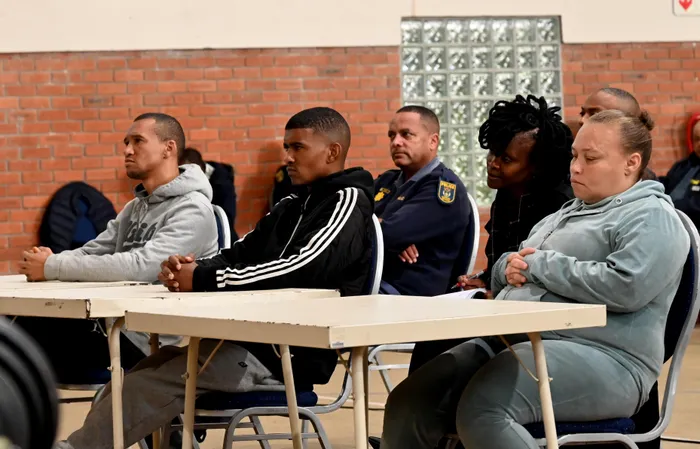Child Trafficking: How South Africa is Failing its Children
CRIME PANDEMIC

In a high profile case involving the disappearance of six-year-old Joshlin Smith (from left) Jacquen Appollis, Steveno van Rhyn, and Kelly Smith were sentenced to life imprisonment for human trafficking and kidnapping in the Western Cape High Court. Our children are the most vulnerable victims of the broken promises of democracy, says the writer.
Image: Ayanda Ndamane/Independent Newspapers
Mary De Haas
When three people found guilty of kidnapping and trafficking six-year-old Joslin Smith, including her mother, received life sentences, hopes were raised that the sentence would send a strong warning to the lowest form of criminal life.
However, although hundreds of children are reported missing annually, with most never found, kidnapping has become a form of extortion prevalent in many communities, to extract ransom money from parents. Our children are the most vulnerable victims of the broken promises of democracy.
Many suffer malnutrition, schooling worse than Bantu education, and horrific abuse and rape. Families and communities do not receive the government support services they should, while far too many girls are having children to access the childcare grants, and neglecting their offspring.
The Smith case, like shock-inducing gender-based violence murders, demands that voters ensure accountability from government departments which is currently lacking – especially Social Development (DSD), Health, the SAPS and courts, who should be protecting and supporting children and their families.
In the late 1980s the apartheid government, realizing the damage done to family life by a century of colonialism, formulated a Family Policy. It was not implemented by the incoming government.
The Department of Social Development is a prime offender, as funding for many NPOs doing good work has been cut. The Children’s Act of 2005 is an excellent piece of legislation but, with exceptions, the training of social workers has plummeted in recent decades, with some accused of criminality. The Family Courts often fail to implement the legislation, as illustrated by the following case not located in KZN
The complicity of Joslin Smith’s mother compounded public outrage, but it is not an isolated case. The daughter of grandmother M, who had not wanted to keep her baby, had left her toddler son T, with M when she left for a job overseas; evidence subsequently emerged that she had probably been trafficked herself.
M loved the baby, and bonded closely with him but, many months after her daughter, with whom communication was erratic, had left, social workers from a local NPO removed the child from his creche, claiming that his mother had ordered it.
The child was placed with a distant cousin he did not know. No documentation was provided to M, who was referred to the Family Court, where she attended and endured regular remands.
There were no reports from DSD social workers, nor any attempt by them to arrange the contact between T and M, as required by the legislation. It transpired that they did not know how to arrange contact or write court reports. M approached the local police about her trafficking concerns, but they did not assist.
Months after T was removed, M’s daughter told her mother she was returning to South Africa but, when she did, and took T herself, she announced she was returning overseas (probably, from previous travels, to the Middle East).
The assistance of the Family Violence Unit and the Hawks was enlisted, to no avail, and an intervention by a social worker for M to the court was ignored. T’s mother, who had lied to the court, was allowed to remove him from South Africa, raising questions about how often Family Courts fail in their mandate.
This M case led to a small group of experienced social workers and academics exchanging ideas and experiences, and engaging with the professional council, to improve training, and to motivate for continuing professional development.
Rigorous practical experience is the most important part of social work training, and too many students have not received it because some universities enrolled more students than staff capacity could handle – and because many were deployed to DSD for the practical component, and often left to fend for themselves.
Students who do not know how to implement legal processes to ensure the best interest of the child, and cannot write coherent reports, should never graduate.
As with other government departments, it may be near impossible to make contact with DSD social workers when they are needed in vulnerable communities. Telephones do not work or are not answered.
With funding for NPOs scarce, many voluntary and faith-based bodies try to fill the gap in child protection. However, given that the most vulnerable communities are often terrorized by drug dealers, and there is an acute shortage of rehabilitation facilities for them, the poor remain the most vulnerable to traffickers. Yet no one is holding the government, and its near-broken criminal justice system, to account.
It was Nelson Mandela who said ‘History will judge us by the difference we make in the everyday lives of children’. His immortal words are a glaring indictment of our government and all of us who fail our children – the future of our country. For our children, every day – not once a year – should be a Mandela Day.
* Mary de Haas is a violence monitor in KZN, a honorary Research Fellow at the University of KZN’s School of Law and a member of the Navi Pillay Research Group on justice and human rights.
** The views in this article do not necessarily represent the views of IOL, Independent Media or The African.